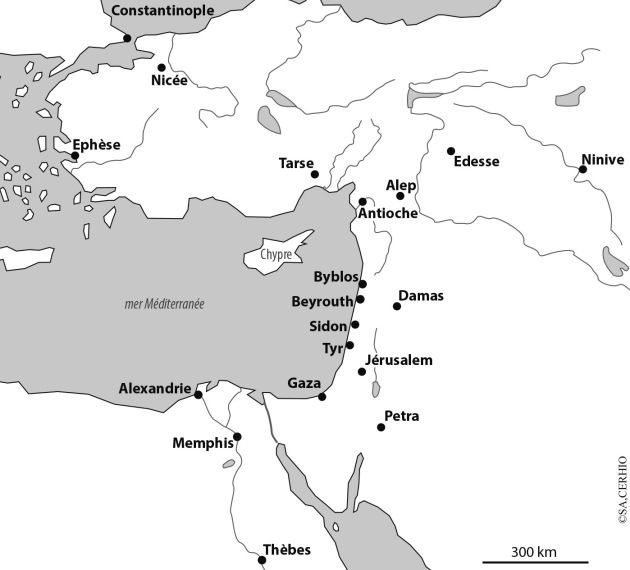A city at the crossroads
Antioch on the Orontes was founded in 300 BC by Seleucus I Nicator[1] in honour of his father Antiochus[2] and became the Seleucids' capital city. It fell under Roman domination in 64 BC and remained the Eastern capital until the foundation of Constantinople in 330. It ranked third among ancient cities, directly after Rome and Alexandria with a population of 500000. In this cosmopolitan city where Greeks, Arameans, Jews and others lived cheek by jowl, all these peoples had their own religions, cults and temples. The city boasted sumptuous public buildings: palaces, schools, hippodromes, theatres, public baths, libraries... it grew on and on, outgrowing its walls and absorbing outlying neighbourhoods. It drew its importance from its control of a vast region including the urban and rural populations between the Amanus Mountains and the Sinai, the Euphrates and the Mediterranean. The size of the region waxed and waned according to the administrative set up in place or the wars in progress, mostly with the Persians. Still the Eastern territory of which Antioch was the capital embraced eight provinces: Palestine, Phoenicia, Syria, Arabia, Mesopotamia, Cilicia, Isauria and Cyprus. It would make up the basis for the Patriarchate[3] of Antioch, in that Ecclesiastical geography concurred with civilian administrative demarcations. Thus the « and all the East »
style adopted by all Oriental rites Patriarch of Antioch charts the patriarchal jurisdiction over these provinces, which accounted for some one hundred bishoprics at the beginning of the 4th century.
A city unique in late Antiquity, Antioch was a centre of Hellenistic culture whose activity reached far beyond the natural boundaries of the province it controlled. It was a trading centre where exchanges on a large scale were conducted with the Persian Gulf, the Mediterranean and their outposts. It was also, like Rome, the meeting point of numerous thinking trends and fashions. There, Libanius[4] illustrated himself as a rhetorician and a Sophist[5] thinker. Its people were fond of exhilarating games and festivals. As a capital city, Antioch enjoyed enormous political, economic and military powers and exercised its influence on a vast network of cities: Edessa, Samosata, Apamea, Homs, Laodicea, Damascus, Beirut, Sidon, Tyre, Ptolemais. Aware of these assets, some emperors, namely Trajan[6]and Constantine[7], manifested their interest by having monuments erected there, others chose it as their place of residence. Julian[8] settled there in 361, Valens[9] between 371-378. Both attempted to contain its people according to their own purpose but they failed, indeed they came to no good end. Antioch went to rack and ruin after falling in Arab hands in 638.







